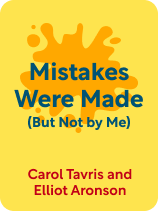

This article is an excerpt from the Shortform book guide to "Mistakes Were Made (But Not by Me)" by Carol Tavris and Elliot Aronson. Shortform has the world's best summaries and analyses of books you should be reading.
Like this article? Sign up for a free trial here.
What is self-justification? Why do we try to justify our wrong actions?
Self-justification is when we try to justify our beliefs or bad things we’ve done. Carol Tavris and Elliot Aronson explain this process in their book Mistakes Were Made (But Not By Me) and how we do it to convince ourselves we’ve done the right thing.
Keep reading to learn what self-justification is, with an example.
Self-Justification, Explained
What is self-justification? Rather than admitting wrongdoing or accepting contradictory beliefs, most people find ways to justify their actions to themselves and others. This process is called self-justification.
The authors distinguish between lying and self-justification—lying requires awareness of what we’re doing. We lie to cover up our actions when we know we’ve done something wrong. In contrast, self-justification is typically an unconscious process. We subconsciously use self-justification to convince ourselves we did the right thing.
This distinction makes self-justification more subtle and persuasive than outright lies as a remedy for the discomfort of cognitive dissonance. While we use lies to deceive others, we use self-justification to deceive ourselves. We truly believe in the reality we create through self-justification: one where we didn’t actually do anything wrong.
(Shortform note: Tavris and Aronson distinguish self-justification as more subtle than lying by stating that lying is always conscious. They also imply that the liar always knows that what they’re saying is false. However, these claims may not be entirely true. Some psychologists argue that pathological liars—people who lie compulsively and habitually—may at least partially believe the lies they tell. Pathological lying is different from self-justification because it often has little to no discernible benefit for the person telling the lies (like avoiding negative consequences). It also isn’t an entirely conscious process. Head injuries, personality disorders, and issues of the central nervous system may all contribute to pathological lying.)
Example: Scratching Another Person’s Car
For example, say you accidentally hit the side of another car as you’re opening your car door in a parking lot. This leaves a small scratch on the other car’s paint. You know you should leave a note with your contact information so you can offer to fix it. The scratch is barely noticeable, though, and leaving a note doesn’t seem worth the trouble. You decide not to do so.
This choice creates dissonance because it contradicts your self-image as an honest, courteous person. However, you protect that image by rationalizing that the owner of the car probably won’t even see the scratch, and they were parked too close to you anyway. You’ve just engaged in self-justification.
How Self-Deception and Self-Justification Hurt Companies
The persuasive power of self-justification doesn’t just hurt individuals—it can hinder the success of entire companies, too. In Leadership and Self-Deception, the Arbinger Institute discusses how self-deception and self-justification keep organizations and leaders from achieving their goals. They argue that companies suffer when their employees are stuck in patterns of self-justifying behavior because it’s impossible to solve problems if the people causing them can’t admit they’re responsible.
If you focus on self-justification over accountability at work, you’ll likely root for others to fail. That way, you can feel vindicated when you self-justify by blaming them for the problems you caused. This hurts the company, as the failure of any member isn’t good for the organization. Additionally, when you’re stuck in self-justifying patterns, your view of gaining results is distorted—you may prioritize your individual success over the success of the team to make yourself look good, even if it’s not in the company’s best interest. This can lead to conflict with others as you withhold resources and information to protect your self-image.

———End of Preview———
Like what you just read? Read the rest of the world's best book summary and analysis of Carol Tavris and Elliot Aronson's "Mistakes Were Made (But Not by Me)" at Shortform.
Here's what you'll find in our full Mistakes Were Made (But Not by Me) summary:
- Why we feel discomfort when we act in a way that doesn't align with our values
- How patterns of self-justification can cause our beliefs to diverge sharply from other people’s
- How we can break the cycle of self-justification and hold ourselves accountable






